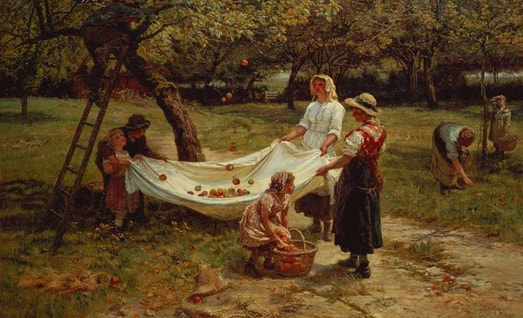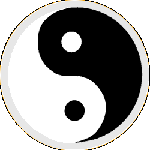
Your choice will double and your pains be halved.
I must be coming from an ancestry of gatherers, an early specialization of the primordial foraging; I have a born inclination to perpetually look around and find things, with an urge to understand what I found and an instant feeling of "what it means to me".
The readiness to discern that you found something is the most important part of finding. All people stumble on things constantly ... but most ignore them because they do not care or see any value... as they are too busy with looking for something they need or want, or know in advance, the narrow thing they are prepared to find at the expense of everything else excluded.
On my daily walk with my two dogs, I chance upon coins lost, nuts fallen, wild strawberries, small fruit in the bushes, butterflies and lizards. Rambling, I glimpse the one swallow not supposed to make spring and discern, without thinking too much, the change of tide in the Zeitgeist. When I read or talk with people, an amazing number of things I meet falls in place with my current interest or kindles unexpected thoughts.
Certainly I have my part of blindness. One simple thing signals it: wherever I learn something new, I soon meet the same in several other places and find many other related to it. Heavens! How little we know!
*
I will stop a moment at finding of what other people missed.
Years ago I was teaching posh workshops secluded in expensive country hotels endowed with inevitable British golf courses. The work was intensive and I needed to relax during the breaks; my favourite was to stroll around the huge golf course and find as many lost balls as possible. I used to find amazingly many considering that players - or their caddies - do their best to recover the material. My sport was to see where these balls remained invisible for the normal seeker and to interpret why they did overlook them and why I did find them.
Recently, in autumn, I like to find fallen nuts on my stroll, particularly after many other passers-by thought that there was nothing left. Most frequently, I fill my pockets. I do not need so many nuts but amuse myself with the same: why do those people miss the nuts. A few days ago, I saw the owner of a huge nut tree leaning over the pathway, leaving with his ladder and pole and basket of nuts. His harvest was ended. I stopped and amassed after him at least a kilogram of nuts.
How did the farmer waste so many?
In both cases the first cause of not finding is not looking, probably by lack of sustained curiosity. The ruminant strain in us, opposed to the curiosity of the animals of prey does not encourage curiosity; we remember that curiosity killed the cat.
The second cause is "knowing" where things must be: the lost golf balls and the fallen nuts "must be" in rationally considered positions. It is not so much that they are camouflaged by some blades of grass or leaves, but simply people have in mind a model of the "proper" places; the divergent spread outside the expected, is, to play with the words, out of bounds for the common person. They do not see the balls (or the nuts) even in full light or in the middle of the road, they do not imagine the rolling, the wind and the awkward angle. Method prevents considering whatever does not fit its own angle and rules.
Probably, the deepest cause of not finding is our prejudiced mental set of linear dry, "value-free" reason; not appreciating that to be permanently on the lookout for something new and irregular is a very profitable attitude in life.
*
The strange thing is that in my wanderings I am not an attentive person, one to see details, I do not scan or analyse everything: I rather gaze with nonchalance, let my eyes roam and grasp spontaneously the shape of the whole, free to observe what stands out from background; the salient within the form. The similar and the different. The instinct of the gatherer is a curiosity for dissimilar impressions; but I become alert to having found something because I also sense potential promise or threat, beauty and usefulness in everything different and new.
*
The strategy of the gatherer and the one of the searcher are radically different.
The searcher - I would say he is a hunter - would go to the flea market - or the huge flea market that is the world around us - pushing ahead his goal with a set vision of what he wants to find and get; he may discover - with luck - that thing he was after; but the statistical chance is meagre; or instead he may renounce seeking and will reasonably prefer to change "profession". Better cultivate, create, manufacture or build that which he seeks. Here comes the industrious, heavy-handed way to interact with nature. Exit the light foot-path!
The gatherer is a modest innovator who uses - often in some new way, on some new path - mainly that upon which he comes across ; he will not inspect and comb the flea market to find this or that precise and usually rare item he needs. Instead, he is out and open to see what interesting things are there to find.
Let me observe that compared to the searcher, the gatherer will find a lot*.
*
The readiness to observe, listen, read and pick from the myriad things met, is a pull-strategy, very different from the push of the searcher, as yin is the opposite face to yang.
Besides understanding quickly enough that you did find something and valuing what you found, the gatherer approach requires flexibility and tolerance to the unexpected. While you do steadily what you are about to do, you need, additionally, lightness and slack: to let your eye, your ear and mind free to roam and your thoughts free to happen by themselves.
I have no merit in finding that the gatherer attitude gives serious advantage; I was born with it, I guess, my only credit may be to put it in words as a recipe for people unlike me who waste opportunity and energy because they do not do more to complete the 99% sweat-squeezing toil of changing the world by their work with the effortless, agile 1% use of what is already at hand .
*
When you resolve what you want to achieve - in you life or in your day - be bold and organized but keep ready for the vague and the unexpected; leave plenty of space for the unplanned hold and fulcrum; expect the accidental turns; too much planning kills the plan; advance-knowing blinds the eye.
A bon entendeur, salut!
__________________________________
*This not at all to claim that gathering and finding are superior to seeking, discovering or making. Superior is to combine these attitudes.

 RSS Feed
RSS Feed